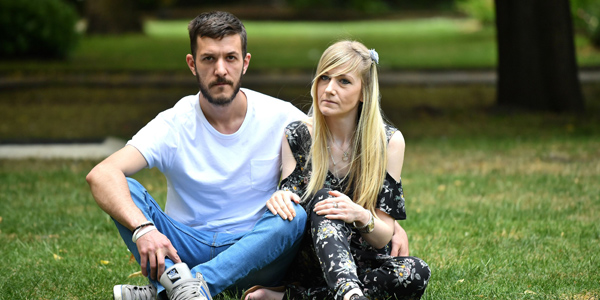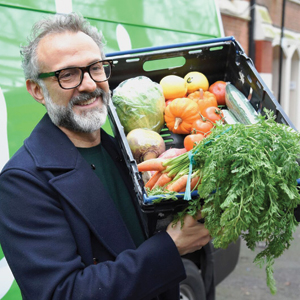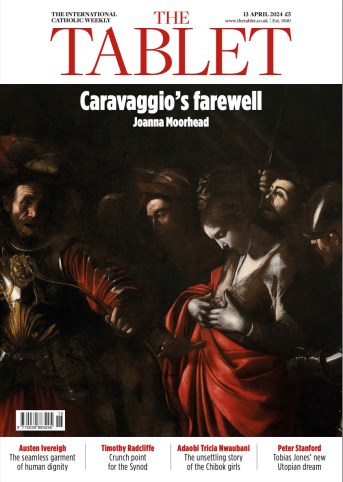When I arrive to interview him about his newly opened community kitchen in Earls Court, west London, the fashionable Italian chef and current darling of the international restaurant scene has disappeared.
I am politely told that he has had to go back up to his hotel room to take a phone call. His American wife, Lara, and teenage son, Charlie, smoothly chat away to me while we wait for him to reappear. I get the impression this has happened many times before. When Massimo Bottura eventually joins us, he settles his wiry frame into a chair, methodically devours a pain au chocolat and begins to talk, quickly and passionately.
It is immediately clear that, while other chefs at the helm of an internationally feted restaurant might be driven by ego, this 54-year-old – he runs the Osteria Francescana in his home town of Modena, which many regard as the best in the world – is inspired instead by his social conscience and altruistic values, which he largely attributes to his Catholic upbringing.
“I grew up playing soccer in the parish school, we were very close to the priest and the education we got from that was always to do things for others. One of the most important things I learnt from growing up in that environment was to share and to help people who don’t have your ability.” Which is, he says, “the real message that the Catholic Church is spreading today – to be for the other, not just for yourself”.
So it is that for the past few years, Bottura has been engaged not in opening new fine dining restaurants, but in the less glitzy role as social campaigner for redistributing what we think of as food waste and turning it into healthy, nutritious meals for those who do not have enough to eat.
In London, under his not-for-profit organisation Food for Soul, Bottura has teamed up with food waste charity, the Felix Project, which collects “high quality, fresh food” destined for the bin from 60 retailers, be they independents or major supermarkets. The food is taken back to the purpose-built kitchen and turned it into lunch for the homeless and vulnerable, Monday to Friday every week.
“Nearly half a million Londoners are going hungry, yet so much is thrown away. We don’t need to produce more food, it just isn’t reaching the right people,” Bottura explains.
The venue for his latest venture, Refettorio Felix, chose him, he says. Already a longstanding drop-in centre for men and women whose lives have come off the rails, St Cuthbert’s Centre, attached to the Anglo-Catholic church of the same name, was itself looking a little down on its luck. Luckily for St Cuthbert’s, the food industry is not the only one with surplus waste, and with the help of donated furniture a volunteer team of local architects was able to transform the hall into an impressively tranquil and airy dining room.
For Massimo Bottura, the setting is vital. He is anxious to press home to me is that this “is not a charity project”. It is, he insists, “a cultural project, where we can rebuild the dignity of the people. Through beauty, through art, through a beautiful space, we can say to everyone: ‘Welcome.’”
Bottura’s vision started in the run-up to the large-scale food fair, Milan Expo, in 2015. As an internationally renowned chef, the organisers were naturally keen for him to take part. But Bottura decided that he did not want to cook at one of the grand functions, as they had expected. Instead, he was determined to engage with the Expo’s central theme, “Feeding the Planet – Energy for Life”, by opening what was intended to be a sort of pop-up soup kitchen. His initial vision was inspired by the 1951 classic art-house film Miracle in Milan, a fantasy story about a group of poor children who, in the final scene, magically fly away on broomsticks. He wanted to open his kitchen under the arches of the central railway station.
The Catholic relief charity, Caritas, agreed to back him. Then Pope Francis lent his support. “Let’s focus on the peripheries,” he said. “The peripheries can be of the city,” Francis added, “but also a human being can be on the peripheries of society…” In this spirit, it seems the Pope pulled a few strings and an old theatre from the 1930s, which had lain abandoned for 15 years and was situated next to a church in one of the city’s poorest districts, became available. “The church had this amazing priest, Don Giuliano – he immediately saw the potential of what we were trying to achieve and he said, ‘Yes, we want it here,’ and so we did it,” Bottura told me proudly.
Under the umbrella of Food for Soul the community kitchen Refettorio Ambrosiano was born. It has become a permanent fixture in Milan, and continues to feed refugees and the homeless. It also serves as a model for other refettorios. There was talk of opening a refettorio at the Vatican, but Bottura explains that the project was strangled in red tape.
Refettorio Ambrosiano was followed by Gastromotiva in Rio de Janeiro, Brazil, set up for the Olympics and still going strong. That, he says, was a radically different experience from opening refettorios in Milan, Bologna, Modena or London. There was no involvement from religious organisations. Instead, he explains, “I was inviting dangerous people in from off the street. On the first night, there was a big knife lying on the side of the table.”
London, Bottura says, is a perfect place for the project. “When people are building walls” – he mentions Brexit, shaking his head – “we are breaking down walls, including, not excluding people.” Londoners, he tells me, took to the concept immediately, whereas in Milan it took him weeks to “get into their hearts”. At first, he says, those coming to the Refettorio in Milan were “incredibly shy, silent, eating and leaving very quickly”. In contrast, in London, “since the first day they were immediately so nice. An old lady, who was 90 years old, said, ‘I see this place as so beautiful; I’m so happy for everybody because I feel the sense of community and I can die happy.’ Everybody was crying, and I thought, ‘Wow, she gets it; she really understands the message of the project.’”
While every community kitchen has a different approach, they are all an evolution of what started in Milan, Bottura explains. “Every place we go, we use different waste ingredients and try to use our knowledge to make the invisible visible.” So, if in Brazil “we have lots of overripe bananas, then we ask a volunteer to make sorbet. They then make it with 50 per cent sugar, so you can’t even taste the fruit. So we say, Let’s make it again with 30 per cent sugar, and then with no sugar … and the fruit flavour just comes out.”
It’s about setting an example, Bottura explains, not just for professional chefs but also for home cooks, to challenge them to see “what they regard as waste” – be it stale breadcrumbs or overripe tomatoes – “as just another ingredient”.
Bottura lights up as he tells me how happy he was when laws to curtail excessive food waste were passed in France and Italy, “two of the most important food nations in the world”, in 2016. “The mayor of a small village outside of Paris said to me, ‘You are my biggest inspiration.’ That meant a lot to me,” he adds, beaming.
Of course Bottura has to transfer his know-how to the cooks in these kitchens so that they can continue to operate in his absence, as clearly he can’t be in all these places at once. He has just learnt that a grant from the Rockefeller Foundation has been received that will enable him to open three refettorios in the United States. The cities are not yet confirmed, but Bottura is already turning over the possibilities in his mind: “Let’s say in the Bronx, in Detroit and – my dream because I’m so passionate about jazz – in New Orleans”.
However the project develops, Milan will always retain a special place in his heart. Getting the first refettorio off the ground was a sort of fulfilment of a farewell promise that he had made to his mother. She was very religious, Bottura explains.
When she was dying, in November 2013, he tells me that he had asked her to stay a little longer as “I have some big news for you”. When she came home for Christmas, he told her: “We will do something with the Church and with Pope Francis. The Pope was really the inspiration for it, because he knows the value of everyone from every walk of life sitting down and eating together, whether it’s a piece of bread or caviar.” When he told his mother of his plans, “she started crying, she was so proud. She had been the one who had pushed me to follow my passion, and not become a lawyer, as my father had wanted.”
Bottura knew then, he tells me, that he would make the refettorio happen, “to use the sense of loss to create something in her name with that spirit of generosity, of belonging, of bringing people together”. It would be something that “goes beyond religion”, he says. Despite being brought up Catholic by the maternal side of his family, “actually I lost everything during my journey of life”, but, he says, he rediscovered it in Milan, by “living the life of the Church” and “through the priest, Don Giuliano”.
Pope Francis has been a “big part of this” too, he says. “He’s not a revolutionary, but he breaks with protocols, and asks, ‘Who am I to judge?’ He’s who the Church needs to dust itself off.” The idiom is idiosyncratic, but I think I know what he means.
Bottura’s mother, as might be expected in a large Catholic Italian family, was instrumental in cultivating young Massimo’s love of food. He recalls in his early years, as the youngest of four boys, sitting under the kitchen table, snatching up and eating falling scraps of pasta for tortellini as the women of the house rolled it out and held it up to the window to check its translucency.
He fondly remembers the warm cup of milk with breadcrumbs, sugar and chocolate she would give him last thing before bed when he was five or six years old. It is also his mother he remembers every Christmas. Although he cooks for his extended family on Christmas Eve, “on Christmas Day I want to be by myself with my family”, which means him and Lara, their two children, and Lara’s mother.
So every year they go to a restaurant, where the chef cooks a special Christmas lunch “as my Mum would have made, with bollito misto, tortellini in broth and a big zuppa inglese for the table, for us all to dip into as we would have done when we were young”. It is, he says, the only day he allows himself to be nostalgic. “I’m a contemporary man, I live all the time in the future, but to keep these memories alive is very important,” he says, as he prepares to leave to make yet more plans to feed the hungry.




 Loading ...
Loading ...
What do you think?
You can post as a subscriber user...
User Comments (0)